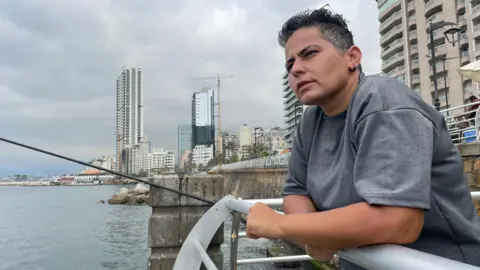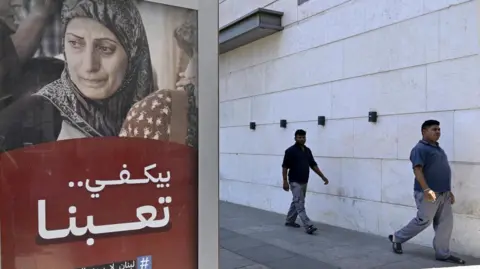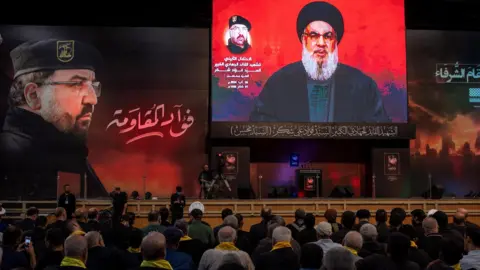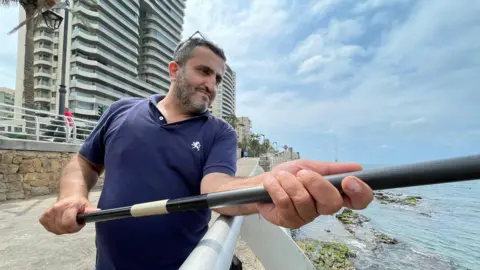 BBC
BBCThe Middle East is in turmoil. International diplomacy is in overdrive. And for once many in Israel, Lebanon and Iran have something in common – a war of nerves.
They worry and they wait for what may come next. It feels like the whole region is holding its breath.
Is this the slide towards an all-out regional war? Can a ceasefire be wrestled from the ruins of Gaza? How will Iran, and its proxy militia Hezbollah, retaliate against Israel for back-to-back assassinations in Beirut and Tehran? Will they heed calls for restraint?
In Lebanon, the stultifying heat of summer is overlaid by a layer of anxiety.
Heart-stopping sonic booms interrupt the hum of traffic in Beirut, as Israeli warplanes break the sound barrier in the skies above.
Many foreign nationals are gone, heeding the advice of their governments. Plenty of Lebanese have fled too.
Others cannot tear themselves away – like the 30-year-old chef of a hip café (Beirut has too many of these to count). She is tattooed and candid but prefers not to be named.
“Living in Beirut is like being in a toxic relationship you can’t escape,” she tells me.
“I am emotionally attached. I have family abroad, and I could leave, but I don’t want to. We live day to day. And we joke about the situation.”
In the next breath she admits business has suffered, and she has post-traumatic stress disorder. “It’s like a cold war for us,” she says. She is expecting a hotter one but hopes it will be short.
 EPA
EPAInternational mediators are criss-crossing the region, working overtime to prevent a wider conflict. The US envoy Amos Hochstein is among them.
“We continue to believe that a diplomatic resolution is achievable,” he said, “because we continue to believe that no-one truly wants a full-scale war between Lebanon and Israel.”
He was speaking in Beirut on Wednesday, after meeting a close ally of Hezbollah, Parliamentary Speaker Nabih Berry.
When asked by a reporter if war could be avoided, Mr Hochstein replied: “I hope so, I believe so.” But he added that the more time goes by, the greater the chances for accidents and mistakes.
 Reuters
ReutersThe last time Israel and Hezbollah went to war, in 2006, it lasted six weeks and caused major damage and loss of life in Lebanon. More than 1,000 Lebanese civilians were killed, along with up to 200 Hezbollah fighters. Of the 160 Israelis killed, most were soldiers.
All sides agree that a new war would be far more deadly and destructive.
And many here in Lebanon agree that the country cannot afford it. The economy is crippled, and the political system is dysfunctional. The government can’t even keep the lights on.
“I hope there won’t be a war,” says Hiba Maslkhi. “Lebanon won’t be able to cope.”
We meet the tracksuit-clad 35-year-old on a slip way at the waterfront in Beirut. She’s focused on the Mediterranean, fishing rod in hand.
“I hope wiser heads will prevail,” she says, “and that we can control the escalation so that things don’t get out of control.”
She takes every sonic boom personally. “If I hear one, I start to panic, and I wonder if they [Israeli forces] have hit near my house or bombed the airport.”
Hiba, who sells perfume for a living, says Lebanon has already suffered enough.
“Ten months is a long time for us to be psychologically destroyed, hiding in our houses,” she says. “We are scared to start businesses to earn some money because we think war might be around the corner.”
The current round of conflict here began last October when Hamas gunmen stormed out of Gaza and killed about 1,200 people in southern Israel, most of them civilians.
Hezbollah soon joined in, firing from Lebanon into Israel. The Shia Islamist armed group and political party – which is classed as a terrorist organisation by Britain and the US – said it was acting in support of the Palestinian people.
Since October, Hezbollah and Israel have been trading fire, causing tens of thousands to flee on both sides of their shared border, and killing more than 500 in Lebanon, most of them fighters. Israeli officials say 40 people have been killed there – 26 of them soldiers.
Fears of a wider conflict were raised at the end of July, when an Israeli strike in Beirut killed a senior Hezbollah commander.
Israel blamed him for the killing of 12 children in a rocket attack on the Israeli-occupied Golan Heights in Syria.
 Reuters
ReutersIt’s already all-out war in Gaza, where Israel has killed almost 40,000 Palestinians at last count, according to figures from the Hamas run health ministry – data the World Health Organisation regards as credible.
Gaza is the main concern for Ayman Sakr. He is fishing alongside Heba, but their views are far apart.
The 50-year-old taxi driver insists that if all-out war comes, Lebanon will deal with it. “There is some concern, but we can handle it,“ he tells us. “In the end we will defend ourselves. If we die, that’s ok.”

He is quick to pay tribute to the hundreds of Hezbollah fighters who have been killed by Israel, and to the leader of the armed group.
“I salute the resistance and those who were martyred from the bottom of my heart,” he says, “and I salute Hassan Nasrallah who made us and all the Arabs proud. Everyone’s worried about Israel, what about the 39,000 people Israel has killed?”
Ayman, who is a father of five, says the horror in Gaza is undeniable, but being ignored.
“The whole world sees children, women and the elderly being massacred every day in front of the cameras and nobody notices,” he says. “People’s children are being killed in front of their eyes. Where is the world? Those who are quiet are complicit.”
Hiba still hopes that full scale warfare can be avoided.
“No-one has the right to kill anyone,” she says, ”not organisations, not parties and not militias. I hope the new generation is wiser than the one that came before it.”










